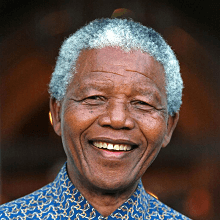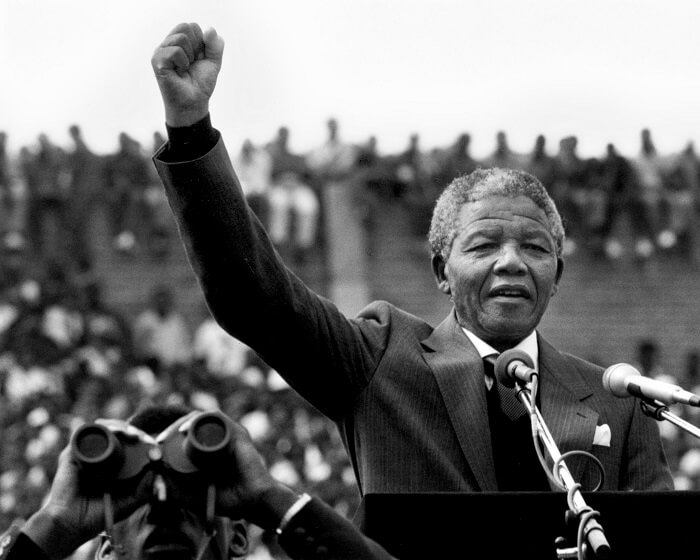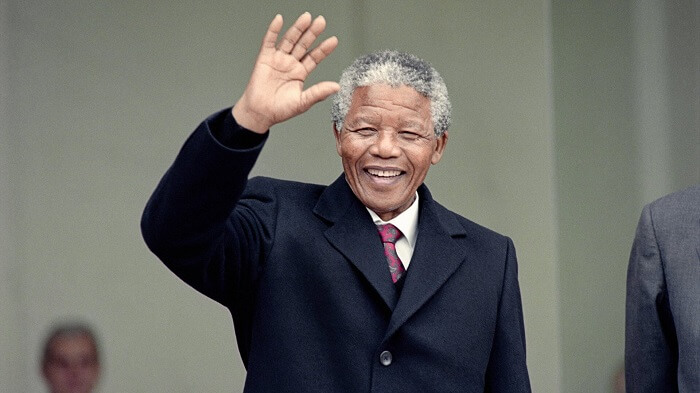NELSON MANDELA
Nelson Mandela was a philanthropist, political leader, and social activist who spent 20 years of his life in prison. He is the man who raised his voice against the government's racial policies and fought with the system of white people. In earlier times, black people were looked down upon, they had no place in society and were discriminated against. Nelson Mandela is the man who fought with the entire system and root out discrimination. He lived 20 years in jail for the others' lives. Mandela will serve as an inspiration to civil rights advocates around the world for centuries to come. He will always be a source of inspiration for those who raise their voice against wrong activities and activists Let us be inspired by his lifelong example and appeal to never give up working for a better and more just world every day: Birth and Early LifeHe was born on July 18, 1918, in Mvezo, a small settlement on the banks of the Mbashe River in Umtata, the Transkei's capital. By blood and custom Mandela belonged to a tribe. His father, Gadla Henry Mphakanyiswa was a chief and Nosekeni Fanny was the mother of Mandela who was a housewife. His father was a polygamist. Gadla had four marriages, from which he had 13 children from 4 wives. Nosekeni Fanny was the third wife of Nelson and Nelson was the son of her. He was too dear to his mother, Nosekeni. Family BackgroundNelson Mandela belonged to a royal family. His ancestors were the King. His father, Gadla Henry Mphakanyiswa was the chief of the tribe and served the village as a counselor. Mandela's upbringing was basic and based on tribal traditions. He was a very simple child who slept on a mat on the ground in the cottages and lived in the huts with his family. He was very kind and humble in the tribal community since childhood. In his early days, he was a Shepard and he played a lot with his animals. His father was found corrupted so he lost title of the Chief of a tribe. Mandela's family hid these things from Mandela and sent him to Qunu village. The Tragic IncidentHis father Gadla died due to lung disease, at that time Nelson was only 12 years old. Mandela's mother was shattered after the death of his husband. Nelson was too young to understand this tragedy. Mandela and his mother left the village and migrated to another village where another chief of a tribe Jongintaba (Regent), adopted Nelson. Jongintaba had made this gesture as a favor to Mandela's father, who had proposed Jongintaba for the position of chief years before. The regent determined it was time for him to mature when he was 16 years old. This is done according to Xhosa custom. His Young LifeMandela was the first person in his tribal community who got the chance to go to school. Mandela was a very humble and most lovable child. One of Mandela's teacher gives him his first name Nelson. Mandela studied Xhosa, history, English, and geography in a one-room school next to the palace. Mandela took an interest in African history at this time. Later, he understood that until the arrival of the white people, the African people had lived in relative peace. He heard from the other chief of tribes that how white people forcefully captured their resources. Higher EducationHe knew that despite all the prejudice, he would study and enrolled at Clarke bury Institute in the Transkei. Clarke bury was Thembu land's highest educational school for Africans at the time. He got the hang of things after a slow and unremarkable start and sped the program, getting the junior certificate in two years instead of the typical three. Mandela entered "Justice" at Healdtown when he was 19 years old, and life there was harsh. Finally, he enrolled at Fort Hare, which was the largest college for higher education at the time, combining Oxford, Cambridge, Harvard, and Yale into one. Like Clarke bury and Healdtown, Fort Hare was a missionary college. Spark of RevolutionThe youngsters of South Africa had traditionally lived as brothers, but white people had fractured this bond. All these experiences shook Mandela. And somewhere Mandela had made up his mind that he would raise his voice against all these evils and would also give everyone the right to live with equality and dignity. He decided that he will fight against the entire system of the government. This was the spark of a great revolution. Years of DifficultyHe had a stepbrother named Justice, and the regent had arranged for their marriage to take place right away. However, Justice fell in love with Mandela's fianc�e, and the two decided to flee. They were able to board a train there, but it only proceeded as far as Queenstown, where the commotion ensued but was eventually resolved and they both moved to Johannesburg, where living was difficult. Mandela lived through a life of illness and poverty. For survival, Mandela worked as a security guard and along with him Justice, Mandela's friend worked as a clerk. Mandela went from a life of opulence to a life of hardship and poverty. He worked as a security guard, while Justice worked as a clerk. So, even though there was little life, it was cheerful. ExperiencesThey were fired as a result of the regent pressure, and they went to meet Dr. A. B. Xuma, the president-general of the African National Congress, an old friend of the regent's. Mandela moved to Alexandria after his brothers split up, where he sometimes went without food or clothing. He learned that the regent was coming to Johannesburg and wanted to see me towards the end of 1941. Mandela was apprehensive, but the conflict was eventually settled. Birth of A LeaderUntil then, he was aware of the plight of African people, including how they are discriminated against and denied the right to vote and receive an education by the entire system of white people. The ANC (African National Congress) was the country's oldest national African group which has been created in 1912. Mandela was starting to realize that his responsibility was to his people as a whole, not simply to a specific portion or branch. Walter Sisulu, a wise mentor, took him under his wing. Walter was a man of great strength, logic, practicality, and dedication. In a crisis, he never lost his cool; he was often deafeningly quiet while others screamed. He thought that the African National Congress (ANC) was the vehicle for change in South Africa. So he joined the ANC party in 1942. Married Life and ChildrenNelson Mandela married Evelyn Rakeepile who was a South African nurse in 1944. But their journey was not too long together and Mandela and Evelyn eventually divorced in 1958 and continued their fight for independence. Nelson married Winnie Madikizela in 1958 and 1996, they separated. In 1998, Mandela married Gra�a Machel. Mandela has total of 7 children. Formation of Young LeagueHe formed Youth League to aid in the recruitment of new members to the organization. On Easter Sunday, 1944, the Youth League was officially founded. He was greatly influenced by Indian leaders, how they all fought with peace and non-violence for the freedom of the country. With the support of the Transvaal Indian Congress, he campaigned against the Asiatic Land Tenure Act and staged enormous demonstrations. Apartheid was Malan's platform, and the horrifying philosophy took effect on July 4, 1948, when the national party (a white-only government) took power. 
Announcement of PrisonThe ANC officially accepted the Youth League's boycott, strike, civil disobedience, and non-cooperation tactics in 1949, with full citizenship as a policy aim. Land redistribution, labor rights, and universal free and compulsory education for all children are all on the table. The Defend Free Speech Convention in Johannesburg in March 1950 and the result of that speech was leading to increased police harassment and the passage of the Suppression of Communism Act, 1950. In 1956, Nelson Mandela and 150 other anti-apartheid activists were imprisoned and charged with treason. Lobbying in politics (they were eventually acquitted). De Wet convicted Mandela and two of his co-accused guilty on June 12, 1964, and announced life prison on four counts. Island of Robben (18 Years of Suffering)Mandela and his co-defendants were moved from Pretoria to the Robben Island prison, where they would spend the next 18 years. It was a difficult term, to say the least. He was subjected to a great deal of suffering, yet he survived it all thanks to his strong resolve. During this time, he acquired tuberculosis and received the harshest treatment from prison authorities because he was a black political prisoner. Mandela and other leaders of the African National Congress were moved to Pollsmoor Prison, in 1982. President P.W. Botha offered Mandela's release in exchange for his renunciation of armed action in 1985, but the prisoner simply refused. Freedom from PrisonWith mounting domestic and international demand for Mandela's release, the government-held multiple conversations with him over the years, but no agreement was reached. 11 February 1990 was the day of the joy of entire black lives after the final announcement of Mandela's releasing from prison. De Klerk also de-banned the African National Congress (ANC), abolished political party restrictions, and put a stop to executions. First Black President of South AfricaAt the age of 77, Nelson Mandela took the oath of President on May 10, 1994. He was the first black president of South Africa and made De Klerk his first deputy. He fought the whole system while being a part of that system. From 1994 to 1999, he fought with selflessness and put his efforts to pass the Minority Rule and apartheid to a black majority administration. In 1991, Mandela won a resounding victory as president of the African National Congress. The national chairperson is Oliver Tambo, a long-time friend, and colleague. 
DeathLast few years of his life when he was in jail, he suffered from Tuberculosis. The reason for being a black leader, he didn't even get the good treatment. So at the same time, he was fighting against the government and his disease as well. And after a long-sufferings from Tuberculosis and Lung Disease, the Great Leader, Nelson Mandela was died at the age of 95, on 5 December 2013. Honor and LegacyNelson Mandela and South African President F. W. de Klerk was honored with the Nobel Peace Prize in 1993 for their efforts to end apartheid. Nelson Mandela was awarded by more than 260 awards across the world throughout his life. He was also awarded by the Bharat Ratna, India's highest civilian honor, in October 1990. During the last months of his captivity, Mandela got his law degree from the University of South Africa. More than 50 universities have bestowed honorary degrees on him. Nelson Mandela demonstrated what our planet and each of us can do if we believe, dream, and work together. His entire life was a struggle for freedom. He is a source of inspiration for many, and we must follow in the footsteps of these great people. Unheard facts about Nelson Mandela It's difficult to keep track of all of Nelson Mandela's achievements and achievements. His acts and insights have influenced us, and there's still so much more to learn about him! Here are few interesting and unheard facts about Nelson Mandela:
Next TopicSwami Vivekananda
|
 For Videos Join Our Youtube Channel: Join Now
For Videos Join Our Youtube Channel: Join Now
Feedback
- Send your Feedback to [email protected]
Help Others, Please Share









